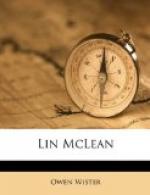They rode on, side by side, and saying nothing after that. The Drybone road was a broad trail, a worn strip of bareness going onward over the endless shelvings of the plain, visible even in this light; and presently, moving upon its grayness on a hill in front of them, they made out the wagon. They hastened and overtook it.
“Put your carbine down,” said McLean to Lusk. “It’s not robbers. It’s your wife I’m bringing you.” He spoke very quietly.
The husband addressed no word to the cow-puncher “Get in, then,” he said to his wife.
“Town’s not far now,” said Lin. “Maybe you would prefer riding the balance of the way?”
“I’d—” But the note of pity that she felt in McLean’s question overcame her, and her utterance choked. She nodded her head, and the three continued slowly climbing the hill together.
From the narrows of the steep, sandy, weather-beaten banks that the road slanted upward through for a while, they came out again upon the immensity of the table-land. Here, abruptly like an ambush, was the whole unsuspected river close below to their right, as if it had emerged from the earth. With a circling sweep from somewhere out in the gloom it cut in close to the lofty mesa beneath tall clean-graded descents of sand, smooth as a railroad embankment. As they paused on the level to breathe their horses, the wet gulp of its eddies rose to them through the stillness. Upstream they could make out the light of the Drybone bridge, but not the bridge itself; and two lights on the farther bank showed where stood the hog-ranch opposite Drybone. They went on over the table-land and reached the next herald of the town, Drybone’s chief historian, the graveyard. Beneath its slanting headboards and wind-shifted sand lay many more people than lived in Drybone. They passed by the fence of this shelterless acre on the hill, and shoutings and high music began to reach them. At the foot of the hill they saw the sparse lights and shapes of the town where ended the gray strip of road. The many sounds—feet, voices, and music—grew clearer, unravelling from their muffled confusion, and the fiddling became a tune that could be known.”
“There’s a dance to-night,” said the wife to the husband. “Hurry.”
He drove as he had been driving. Perhaps he had not heard her.
“I’m telling you to hurry,” she repeated. “My new dress is in that wagon. There’ll be folks to welcome me here that’s older friends than you.”
She put her horse to a gallop down the broad road toward the music and the older friends. The husband spoke to his horse, cleared his throat and spoke louder, cleared his throat again and this time his sullen voice carried, and the animal started. So Lusk went ahead of Lin McLean, following his wife with the new dress at as good a pace as he might. If he did not want her company, perhaps to be alone with the cow-puncher was still less to his mind.




